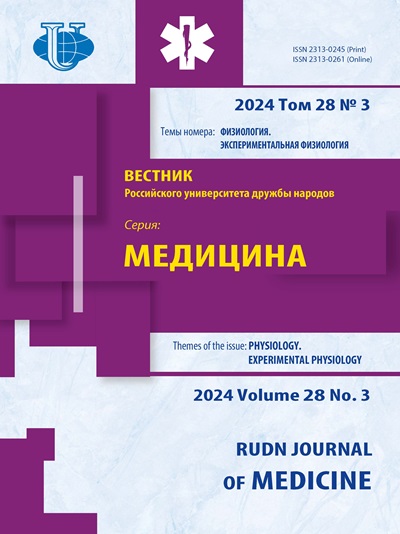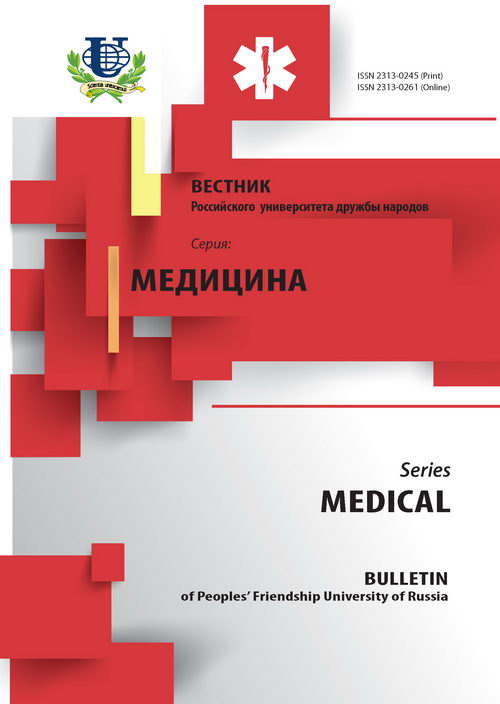Информированность родильниц по проблемам грудного вскармливания
- Авторы: Хамошина М.Б.1, Руднева О.Д.1, Захарова Н.И.1, Союнов М.А.1, Лебедева М.Г.1, Лукаева Д.Д.2, Есипова Л.Н.3
-
Учреждения:
- Российский университет дружбы народов
- Детская городская поликлиника № 99, Филиал № 1
- Городская клиническая больница № 29
- Выпуск: № 2 (2016)
- Страницы: 33-38
- Раздел: Статьи
- URL: https://journals.rudn.ru/medicine/article/view/3324
Цитировать
Полный текст
Аннотация
Об авторах
Марина Борисовна Хамошина
Российский университет дружбы народов
Email: mbax999@yandex.ru
Ольга Дмитриевна Руднева
Российский университет дружбы народов
Email: 89037228356@yandex.ru
Нина Ивановна Захарова
Российский университет дружбы народов
Email: oor@bk.ru
Мухаммедназар Аманович Союнов
Российский университет дружбы народов
Email: msoiunov@mail.ru
Марина Георгиевна Лебедева
Российский университет дружбы народов
Email: lebedeva1108@rambler.ru
Дарья Дмитриевна Лукаева
Детская городская поликлиника № 99, Филиал № 1
Email: aleksei_lukaev@mail.ru
Лариса Николаевна Есипова
Городская клиническая больница № 29
Email: o-roudneva@yandex.ru
Список литературы
- ABM Clinical Protocol №5: Peripartum Breastfeeding Management for the Healthy Mother and Infant at Term Revision, June 2008. Breastfeeding Medicine. 2008. Vol. 3. ABM Clinical Protocol No. 5. No. 2. P. 129-132.
- Ahnfeldt-Mollerup P., Petersen L.K., Kragstrup J. et al. Postpartum infections: occurrence, healthcare contacts and association with breastfeeding: Postpartum infections and impact on breastfeeding. Acta Obstetricia et Gynecologica Scandinavica. 2012. Vol. 91. Postpartum infections. No. 12. P. 1440-1444.
- American Academy of Pediatrics. Breastfeeding and the Use of Human Milk. American Academy of Pediatrics. Pediatrics. 2012. Vol. 129. No. 3. P. 827-841.
- Breastfeeding and the risk of breast cancer in BRCA1 and BRCA2 mutation carriers. Breast Cancer Research: BCR. 2012. Vol. 14. No. 2. P. 42.
- Figueiredo B., Dias C.C., Brandão S. et al. Breastfeeding and postpartum depression: state of the art review. Jornal de Pediatria. 2013. Vol. 89. Breastfeeding and postpartum depression. No. 4. P. 332-338.
- Greer F.R., Sicherer S.H., Burks A.W. Effects of early nutritional interventions on the development of atopic disease in infants and children: the role of maternal dietary restriction, breastfeeding, timing of introduction of complementary foods, and hydrolyzed formulas. Pediatrics. 2008. Vol. 121. Effects of early nutritional interventions on the development of atopic disease in infants and children. No. 1. P. 183-191.
- Khamoshina M.B., Roudneva O.D., Zakharova N.I. Questionable questions of breastfeeding: the medical workers’ attitude. Materials of the II Interdisciplinatory forum «Medicine of the mammary gland» - Publishing house of the StatusPraesens journal. 2012. P. 66.
- Schwarz E.B. Lactation and maternal risk of type 2 diabetes: a population-based study. The American Journal of Medicine. 2010. Vol. 123. Lactation and maternal risk of type 2 diabetes. No. 9. P. 863.e1-6.
- Schwarz E.B., McClure C.K., Tepper P.G. et al. Lactation and maternal measures of subclinical cardiovascular disease. Obstetrics and Gynecology. 2010. Vol. 115. No. 1. P. 41-48.
- Stuebe A.M., Rich-Edwards J.W. The reset hypothesis: lactation and maternal metabolism. Am. J. Perinatol. 2009. No. 26. P. 81-88.
- Su D. Ovarian cancer risk is reduced by prolonged lactation: a case-control study in southern China. American Journal of Clinical Nutrition. 2013. Vol. 97. No. 2. P. 354-359.
- Sullivan S. An exclusively human milk-based diet is associated with a lower rate of necrotizing enterocolitis than a diet of human milk and bovine milk-based products. The Journal of Pediatrics. 2010. Vol. 156. No. 4. P. 562-567.
- World Health Organization. Infant and Young Child Feeding: Model Chapter for Textbooks for Medical Students and Allied Health Professionals. World Health Organization. 2009.
- World Health Organization. Long-term effects of breastfeeding: a systematic review. World Health Organization., 2013.
















